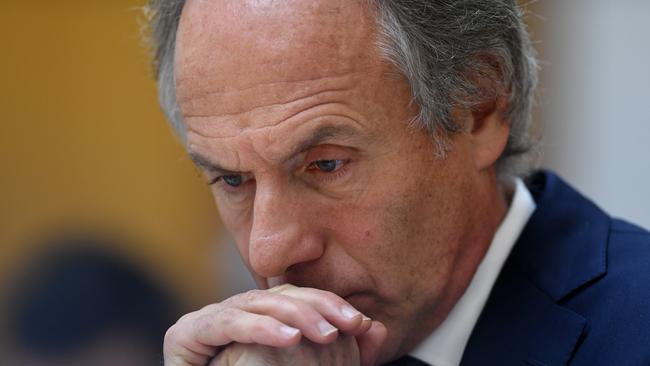Chief scientist Alan Finkel to deliver report on solutions to our ailing energy system
AFTER a statewide blackout, soaring power prices, gas shortages and endless political point-scoring, the nation’s leaders will be handed a report intended to deliver leadership and stability.
Opinion
Don't miss out on the headlines from Opinion. Followed categories will be added to My News.
- Alan Finkel: Australia should aspire to world’s best electricity network
- Dam fine way to power our future
- Creation of a state energy target likely to drive up electricity costs
- Push for energy intensity scheme — instead of carbon tax
AFTER a statewide blackout, soaring power prices, gas shortages and endless political point-scoring, the nation’s leaders will on Friday be handed a report intended to deliver leadership and stability to Australia’s ailing energy system.
What is the report being handed down?
Chief Scientist Alan Finkel led a panel conducting the Independent Review into the Future Security of the National Electricity Market. Often referred to as the Finkel review, it was agreed to at an emergency meeting of the nation’s energy ministers following South Australia’s statewide blackout last September. At the time, federal Energy Minister Josh Frydenberg said it would provide a “blueprint” for Australia’s power security to guide reforms of the national market, ensuring energy security and affordability as the country relies more on renewable energy sources.
Why was the review needed?
Climate and energy policies in this country have long been at odds. Policies to address climate change and greenhouse gas emissions have been mired in politics, particularly since the failed attempts to create an emissions trading scheme contributed to the demise of Malcolm Turnbull as opposition leader and Kevin Rudd as prime minister. The review grew from the need to put politics aside, but the trigger was the SA statewide blackout, which put the problems plaguing the country’s grid on the national agenda.

What is Dr Finkel expected to recommend?
All money is on Dr Finkel recommending a Low Emissions Target as a central energy and environmental policy for the future. He had reportedly favoured an Energy Intensity Scheme but, shortly after the review began, the Coalition Government ruled it out, likening it to a carbon tax. Other key recommendations are likely to include placing a value on inertia (stability in the system currently provided through the big spinning turbines of traditional generators) and legislating guidelines for large generators leaving the system.
What is an Energy Intensity Scheme?
An EIS can be confined to the energy sector, which creates about one-third of Australia’s carbon emissions. The Government would set a baseline for allowable tonnes of carbon dioxide output per megawatt hour of electricity. Any generator producing less CO2 than the baseline would earn “credits”, which could be sold to those that produced CO2 above the baseline. Australia’s average energy intensity is currently about 0.9 tonnes of CO2 per megawatt hour. Wind and solar is 0, gas between 0.4 and 0.7, black coal 1 and brown coal can be as high as 1.6. The baseline could be set, as an example, at 0.7 tonnes of CO2 per megawatt hour, which would allow gas and renewable generators to create credits that coal generators would have to purchase. Criticism of the scheme includes the Government losing control on the overall emissions created by the sector. As it would likely penalise coal, it has also been unpopular among that industry and has been likened to a carbon tax, despite the Government collecting no money from it.

What is a Low Emissions Target?
An LET would have much the same effect as an EIS. But it works in a slightly different way that is similar to the current Renewable Energy Target. The RET scheme creates certificates for each megawatt-hour of eligible renewable electricity, which can then be sold to energy retailers that need them to meet regulatory requirements. To transform this into a LET, the Government would set an emissions threshold where any generation under that threshold is considered “clean energy” and would earn certificates. It has been reported that the Finkel report will recommend a threshold of 0.7 tonnes of CO2 per megawatt hour, which would allow gas generators and coal with carbon capture technology to generate certificates. This would attract similar criticism from coal generators, which would argue it disadvantaged them because they would likely find it difficult to earn certificates. The other criticism is that, because the onus is on retailers to source a set amount of clean energy, it adds another layer of administration, making the system less efficient.
Why can’t politicians agree?
The Coalition’s policy to scrap the carbon tax was a key factor in its 2013 election victory. Many Government MPs believe they cannot risk backing an EIS because it has been likened to a carbon tax. This is despite widespread support for the scheme, including from the CSIRO, Australian Energy Market Commission and major energy market players including BHP, AGL and Origin Energy. Federal Labor’s policy backs an EIS to help drive energy generation to a 50 per cent renewable energy target by 2030. The Coalition has warned against the economic impact of such a high target. The SA Government has also advocated for an EIS.
What happens next?
Dr Finkel’s review will today be handed to Prime Minister Malcolm Turnbull, premiers and territory chief ministers at the Council of Australian Governments meeting in Hobart. He will give them a brief presentation about the key issues and recommendations. It is likely governments at all levels will take some time to digest the report before announcing a formal response. However, Coalition MPs have already been talking up an LET as an acceptable mechanism and Opposition Leader Bill Shorten has expressed Labor’s willingness to consider such a policy.


